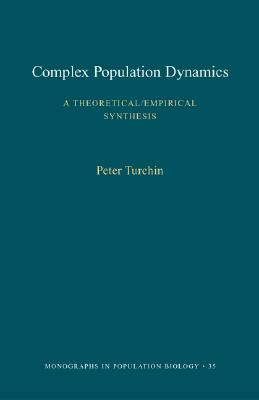

 Princeton University Press
Princeton University Press
Complex Population Dynamics: A Theoretical/Empirical Synthesis (Mpb-35)


Key Metrics
- Peter Turchin
- Princeton University Press
- Paperback
- 9780691090214
- 8.48 X 5.6 X 1.15 inches
- 1.2 pounds
- Science > Life Sciences - Ecology
- English
 Secure Transaction
Secure TransactionBook Description
Why do organisms become extremely abundant one year and then seem to disappear a few years later? Why do population outbreaks in particular species happen more or less regularly in certain locations, but only irregularly (or never at all) in other locations? Complex population dynamics have fascinated biologists for decades. By bringing together mathematical models, statistical analyses, and field experiments, this book offers a comprehensive new synthesis of the theory of population oscillations.
Peter Turchin first reviews the conceptual tools that ecologists use to investigate population oscillations, introducing population modeling and the statistical analysis of time series data. He then provides an in-depth discussion of several case studies--including the larch budmoth, southern pine beetle, red grouse, voles and lemmings, snowshoe hare, and ungulates--to develop a new analysis of the mechanisms that drive population oscillations in nature. Through such work, the author argues, ecologists can develop general laws of population dynamics that will help turn ecology into a truly quantitative and predictive science.
Complex Population Dynamics integrates theoretical and empirical studies into a major new synthesis of current knowledge about population dynamics. It is also a pioneering work that sets the course for ecology's future as a predictive science.
Author Bio
Peter Turchin is a complexity scientist who works in the field of historical social science that he and his colleagues call Cliodynamics. His research interests lie at the intersection of social and cultural evolution, historical macrosociology, economic history, mathematical modeling of long-term social processes, and the construction and analysis of historical databases.
Currently he investigates a set of broad and interrelated questions: How do human societies evolve? In particular, what processes explain the evolution of ultrasociality—our capacity to cooperate in huge anonymous societies of millions? Why do we see such a staggering degree of inequality in effectiveness of governance and economic performance among nations?
Peter has published two hundred articles, including a dozen in such top journals as Nature, Science, and PNAS (see Academic Publications). His publications are frequently cited and in 2004 he was designated as “Highly Cited Researcher” by ISIHighlyCited.com.
He has authored eight books (see Books), including
- Secular Cycles (with Sergey Nefedov, Princeton, 2009), War and Peace and War (Penguin, 2005),
- Ultrasociety: How 10,000 Years of War Made Humans the Greatest Cooperators on Earth and
- Ages of Discord: A Structural-Demographic Analysis of American History.
Source: PeterTurchin.com
Videos






Community reviews
Write a ReviewNo Community reviews